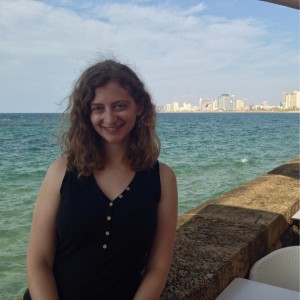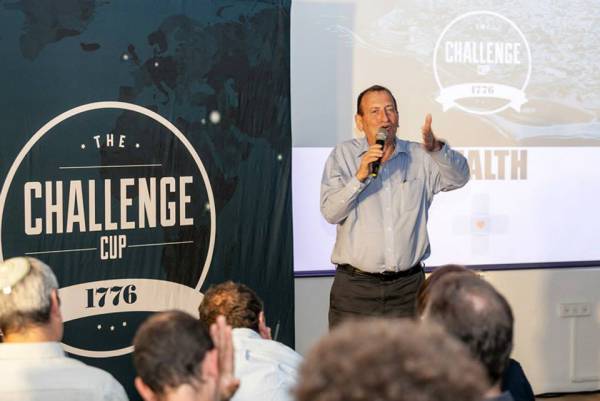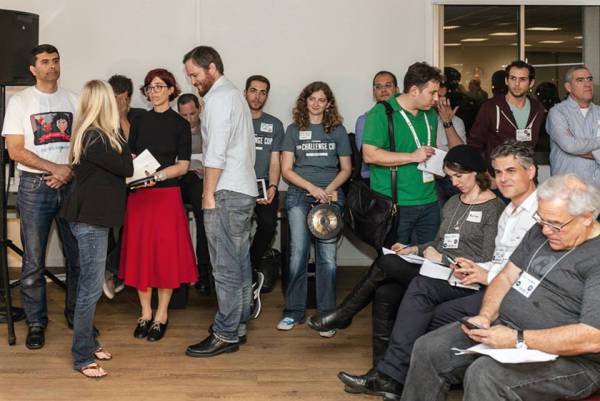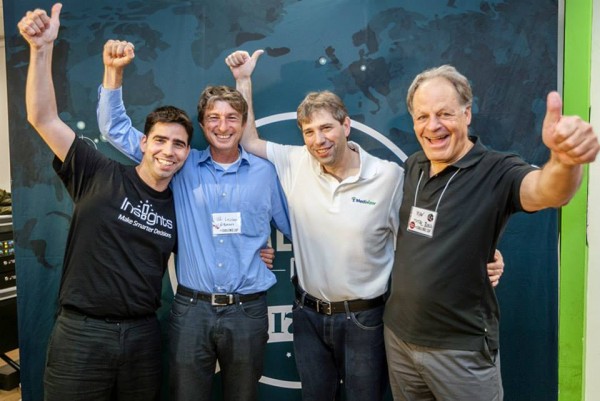Allie Bernstein is interning with Tel Aviv Global City
With the end of my internship approaching next week (aahhhhhh!), I’ve been reflecting on the skills I acquired, the concepts I learned, the fun I had, the friendships I made, and the delicious lunch places I discovered on Rabin Square. So now you have to read a post I wanted to write a month ago about my work. (December was a busy month!)
On December 4, I got to take part in an event that was definitely a highlight of my internship at Tel Aviv Global. It was (as you may have guessed by the title of this post) the 1776 Challenge Cup Tel Aviv.
1776 is a DC-based startup incubator. They’re hosting the Challenge Cup, in which they go to 16 cities around the world and host competitions to crown a winning startup in each of the fields of Energy, Health, Education, and Cities. Their philosophy is that our lives as consumers have changed drastically over the last 20 years or so, but our lives as citizens are stagnant – and that needs some shaking up. The winner of each category from each city will be flown to DC for the final round in May, and the winners of that round get the big prizes, like access to funding, press, and beyond.
Tel Aviv was a good choice for the competition – after all, it was named the second best startup ecosystem in the world after only Silicon Valley, and there are over 700 startups in the city. (#nobig) Ours took place at The Library, a city-sponsored coworking space for early stage startups.
Tel Aviv’s Mayor Ron Huldai (also known as Jewish Christopher Eccleston) welcomes the crowd.
I really appreciate the fact that 1776 tries to make the day-and-a-half competition worthwhile to all competitors, not just the winners. The night before and the day of the competition, they hosted roundtable discussions with mentors and peers to give feedback on the startups’ business models, pitches, and ideas. One of the startups I met, What’s Due, used me as market research for potential drastically different formats they’d thought about during the meetings.
The competition seems simple enough: present your company’s one-minute pitch. But I dare you to describe your life’s work in less than five minutes, let alone one. 1776 provided helpful formulas of how to break it down – for example, 10 seconds on an introduction, 30 seconds on the company itself, 5 seconds on plans, etc. Plus there was plenty of helpful overall guidance, like how to build a story within your minute. Whew.
All of the companies had the opportunity to give their pitch to the judges. Some went better than others, with one or two starting to talk and then staring glassy-eyed at the judges for 45 seconds. Luckily, many of the judges had been working with the entrepreneurs throughout the day, so they didn’t have to rely entirely on the pitch if it flopped.
But here is the most important part: my fellow intern Daniel held the iPad with the one-minute timer, and I GOT TO RING THE GONG.
True Story
Anyway, the judges debated and then selected two finalists in each category, who then presented their five-minute pitch. I found these completely fascinating and will now tell you allllll about them. (The winner of each category is denoted by a star.)
Education
iMagine Machine: This dad started his pitch by explaining that when he sends his daughters to school, he knows they aren’t enjoying subjects like math. They don’t like it and they don’t want to do their homework. But they are great at games. So why can’t we take the adventures, the castles, the dragons of games and put them into math to make it fun? He created a software company that makes fun games while teaching kids math at different levels. Parents can receive weekly summaries with how far their kids have progressed. He cited impressive figures of downloads, plays, and recommendations from kids, parents and teachers.
*Total Boox: This company started their pitch with “how many of you have bought a book and never read it?” Of course, everyone raised their hands. Their theory is that you should only have to pay for the amount of the book you read. So if you buy an e-book through them and only read 5%, you only pay for 5%. (As a bookworm who delights in reading books literally cover to cover, this idea rubs me the wrong way, but I can see the value in it. Especially textbooks – can you even imagine how much money college students could save?)
Energy
*Aquanos: These guys treat wastewater with algae instead of machinery. The natural process not only produces clean water, but also produces one or two byproducts that companies can then sell for a profit. Using algae instead of machines cuts down on 90% of energy consumption in the process. 90%!
Sensibo: You can buy a small device through this company that you attach to your air conditioner to make it smart. The device connects to your smart phone so you can set it from afar without having to leave it on all day (or worry that you left it on all day). It also tells you a wealth of useful information, such as how much money you could save on your energy bill by adjusting a degree or two, or when a filter needs changing.
Health
*Medivizor: This guy’s pitch started with “When I was told my 10-year-old daughter needed a new heart…” He and his wife were (of course) panicked about what they needed to do, and had a very difficult time finding anything out about what they should do on their own. I liked how he phrased it: “We don’t go to Google for personalized movie recommendations, we go to Netflix. We don’t go to Google for personalized music ideas, we go to Pandora. So why are we still going to Google for health issues, which is the most personal thing of all?” I know from my own experience that it is pointless, frustrating, and scary to search for your health issue online. So he created an app where you enter your specific issue, and are asked specific questions about it. You then receive summaries of your specific illness and specific recommended treatments explained by a team of scientists in 10th grade English in 300 words or less. But that’s not all – the doctor has a version on his end too. There are thousands and thousands of papers and studies published each year on every disease, and he can’t possibly keep up with all of them, let alone find ones that are relevant to his patients’ specific conditions. The app will guide him towards new research that might actually be useful for the patients’ specific conditions. (Mind blown. This was my favorite startup of the night, as you can probably tell by the length of this description.)
Myndlift: This is a really cool device and software that helps people with ADHD. Drug treatments are often expensive and cause a ton of side effects. Neurotherapy is crazy expensive and only available at specific hospitals. This device, though, makes neurotherapy accessible and affordable. You wear the headset that measures your brain waves and do regular, daily exercises to help control your symptoms. It reads your brain waves and personalizes your treatment. Simple and brilliant.
Cities
Vitalitix: I sent this excellent idea along to my former coworkers at AARP because it helps the elderly through crowd caring. Through this company, an elderly person has the ability to call for help in issues that aren’t life-threatening, but still difficult. Let’s say grandma lives at home alone and her power goes out. She can open the app and say she needs help. Her caregiver (let’s say mom) gets a notification of what’s going on, as well as a list of nearby angels. The angels are people who mom and grandma have approved – friends, neighbors, etc. Mom can send the message out to nearby angels, and whoever is free can respond and stop by to help grandma. Not only does this help the elderly person in need, but it gives so much relief to caregivers and family members.
*Insights: This website creates a crowdsourcing platform for cities to gain valuable…insights. A city can pose a question, such as “What should we do with the open space on Third Avenue?” Residents can respond with their thoughts and ideas, and the system sorts responses by relevance and the number of people who suggested the idea. This makes it much easier for city officials to get relevant feedback without wasting a lot of time or effort in collecting, sorting, and analyzing data.
The winners of the evening!
You can see all the photos from the night on the 1776 Facebook page. (And credit for the photos I used here of course goes to 1776.) I’m looking forward to hearing the results of the final round in May and to seeing if the Startup City of the Startup Nation kicks some startup butt!







